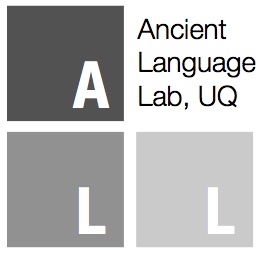Ancient Language Lab
The Ancient Language Lab in the School of Languages and Cultures at the University of Queensland is pursuing ground-breaking methods for unravelling human societal pasts, through evidence contained in languages.
All languages descend from ancestors, and because languages change ceaselessly over time, they contain a steadily decaying trace of long-past interactions and relationships with other ancient tongues and their living descendants. For example, English contains strong traces of its close relationship to Dutch, and of the interaction a thousand years ago between Old English and Norman French. It also contains much fainter traces of a far deeper ancestral relationship with languages such as Sanskrit and Ancient Greek. Similar traces exist in all languages, if we can but detect them.
The Ancient Language Lab at the University of Queensland is innovating new methods for detecting these ancient signals, in particular by developing a new generation of high-definition, high-fidelity measurements of language traits. An empirical focus is on the languages of indigenous Australia. We warmly welcome proposals for collaboration.
The Ancient Language Lab is supported by the School of Languages and Cultures, UQ and Australian Research Council grant DE150101024.
People

Dr Erich R. Round (ARC DECRA Senior Research Fellow, UQ)
Director
Assoc. Prof. Claire Bowern (Yale)
Scientific Advisor
Jayden L. Macklin-Cordes (BA Hons, first class, UQ)
PhD candidate, focusing on micro-variate and phylogenetic research.
Amy Parncutt (BA Hons, first class, UQ)
Research Assistant, focusing on micro-variate analysis and reduplication.
Katja Manne (UQ)
Honours student, focusing on automated cognate identification.
Jordan Hollis (UQ), Bonnie McLean (ANU), Peter Nyhuis (UMelbourne), Genevieve Richards (UQ), Rebecca Taranto (UQ)
Summer researchers, focusing on morphological complexity, semantic networks, and Cape York.
Interested in joining us? Send us an email.
Students with a strong background in descriptive linguistics and mathematics, statistics, bioinformatics or computer science are especially encouraged to enquire.
Publications & presentations
Ennever, Thomas, Felicity Meakins & Erich R. Round (2015) Softening the task of lenition analysis: an automated tool for the analysis of stop lenition. 46th annual conference of the Australian Linguistics Society, Sydney.
Macklin-Cordes, Jayden L. & Round, Erich R. (2015) High-Definition Phonotactics Reflect Linguistic Pasts. Proceedings of the 6th Conference on Quantitative Investigations in Theoretical Linguistics. Tübingen: University of Tübingen. 5pp. http://dx.doi.org/10.15496/publikation-8609
Parncutt, Amy & Erich R. Round (2015) The Australian reduplication project. 46th annual conference of the Australian Linguistics Society, Sydney.
Round, Erich R. (2015) More and better characters: The next big boost for phylogenetic algorithms. At Capturing Phylogenetic Algorithms for Linguistics, Lorenz Centre, Leiden.
Round, Erich R. & Jayden Macklin-Cordes (2015) On the design, in practice, of typological microvariables. New Developments in the Quantitative Study of Languages, Helsinki.
Round, Erich R., (2014). ‘What to report? — Bayesian clustering & researcher degrees of freedom’. Conference on Time and Space in Linguistics. Aarhus.
Round, Erich R., (2013). ‘Big data typology and linguistic phylogenetics: design principles for valid datasets’. 21st Manchester Phonology Meeting, Manchester.
Round, Erich R., (2013). ‘The phonologically exceptional continent: a large cross-linguistic survey reveals why Australia is, and is not, typologically unusual’. Association for Linguistic Typology 10th Biennial Conference, Leipzig.
